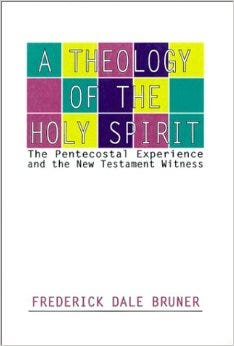Does Luke (in Acts) View Baptism in a Sacramental or Spiritual Way? A Quote from Frederick Dale Bruner

From A Theology of the Holy Spirit: The Pentecostal Experience and the New Testament Witness:
"Of most importance, the response which is men's in repentance is not merely required in preaching or offered and symbolized in baptism, it is enabled through both preaching and baptism. In this sense, too, repentance is accepting baptism. Repentance is not something to be done at home or worked on; it is received 'in the church,' as a response to God's offer and work tendered in human words and human acts (the acts of others!) in preaching and baptism. God gives repentance (Acts 11:18: 'God has granted repentance unto life') and men should accept it where here it is placed: in the invitation to Christian baptism.
"The baptism offered by Peter is 'in the name of Jesus Christ,' that is, it is to bring men into his fellowship and possession....To be baptized in, into, or as here, literally, 'upon' the name of Jesus Christ means to become his, and to become his means, by definition, to receive his Spirit (1:8; I Cor. 6:17; Rom. 8:9). To argue otherwise is to posit a Spirit-less Christ." (167-68) Bruner footnoted the last sentence. Here's what he says in that footnote:
"In his desire to avoid sacramentalism with its apparent binding of God to baptism, Markus Barth seems to have missed the meaning of the biblical one-baptism and his entire book on baptism becomes inevitably a de facto apologetic for two baptisms: 'water baptism' and a separate, sovereignly given 'Spirit-baptism.'...However, Luke is not purely spiritual in the usually understood sense, even though he, like Barth, places the highest worth upon the Holy Spirit. Nor is Luke what Barth fears others find him to be – a sacramentalist. Luke is both – simultaneously – and therefore neither in their usually understood senses. That is, Luke is an incarnationalist and he understands the gift of the Holy Spirit as given through the earthly, human means of the one baptism. This fact – the incarnational joining of the divine and the human, of the Spirit and baptism in one great event – finds one of its clearest expressions in the New Testament at Acts 2:38...." (167n11; emphasis mine)
Bruner then continues in the main text:
"The baptism in the name of Jesus Christ, according to Luke's account, includes both the forgiveness of sins and the reception of the gift of the Holy Spirit (2:38b) – together. This single two-fold benefit corresponds exactly to the Old Testament promise of the coordinate forgiveness of sins and gift of the Spirit (Jer. 31:31-34; Ezek. 36:24-27). The baptism is, in the careful formulation, 'for the forgiveness of your sins; and you shall receive the gift of the Holy Spirit.'
"It is particularly important to emphasize that sins, according to this important Acts text, are not cleansed away by devout effort so that the Spirit may be received after the candidate's cleansing of his heart. Instead, God promises to remove sins in the water of baptism and therewith to grant the sanctifying gift of the Spirit (cf. Acts 22:16). The cleansing from sin, like the gift of the Spirit, is God's work and therefore God's present. There is no cleansing initiation mentioned in the New Testament except that which is recorded here (cf. Acts 15:8-9; I Cor. 6:11)." (167)


